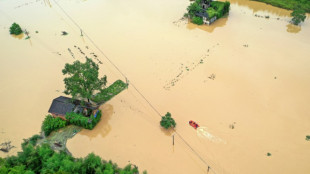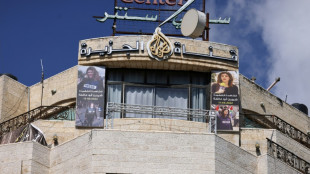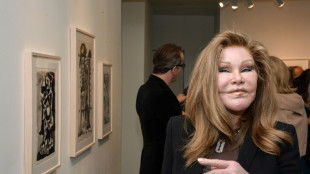
-
 Premier League chief fears Club World Cup's impact on Man City and Chelsea
Premier League chief fears Club World Cup's impact on Man City and Chelsea
-
US mulls new restrictions on Chinese drones

-
 Rosita Missoni of Italy's eponymous fashion house dies age 93
Rosita Missoni of Italy's eponymous fashion house dies age 93
-
27 sub-Saharan African migrants die off Tunisia in shipwrecks

-
 UK grime star Stormzy banned from driving for nine months
UK grime star Stormzy banned from driving for nine months
-
Neil Young dumps Glastonbury alleging 'BBC control'

-
 Swiatek battles back to take Poland into United Cup semis
Swiatek battles back to take Poland into United Cup semis
-
Electric cars took 89% of Norway market in 2024

-
 Rival South Korea camps face off as president holds out
Rival South Korea camps face off as president holds out
-
French downhill ace Sarrazin out of intensive care

-
 Djokovic cruises past Monfils as rising stars impress in Brisbane
Djokovic cruises past Monfils as rising stars impress in Brisbane
-
Montenegro mourns after gunman kills 12

-
 Sales surge in 2024 for Chinese EV giant BYD
Sales surge in 2024 for Chinese EV giant BYD
-
Agnes Keleti, world's oldest Olympic champion, dies at 103

-
 Andreeva, Mpetshi Perricard showcase Australian Open potential
Andreeva, Mpetshi Perricard showcase Australian Open potential
-
Afghan refugees suffer 'like prisoners' in Pakistan crackdown

-
 Coach tight-lipped on whether Rohit will play in final Australia Test
Coach tight-lipped on whether Rohit will play in final Australia Test
-
Blooming hard: Taiwan's persimmon growers struggle

-
 South Korea's impeached president resists arrest over martial law bid
South Korea's impeached president resists arrest over martial law bid
-
Knicks roll to ninth straight NBA win, Ivey hurt in Pistons victory

-
 'Numb' New Orleans grapples with horror of deadly truck attack
'Numb' New Orleans grapples with horror of deadly truck attack
-
Asia stocks begin year on cautious note

-
 FBI probes 'terrorist' links in New Orleans truck-ramming that killed 15
FBI probes 'terrorist' links in New Orleans truck-ramming that killed 15
-
2024 was China's hottest year on record: weather agency

-
 Perera smashes 46-ball ton as Sri Lanka pile up 218-5 in 3rd NZ T20
Perera smashes 46-ball ton as Sri Lanka pile up 218-5 in 3rd NZ T20
-
South Korea police raid Muan airport over Jeju Air crash that killed 179

-
 South Korea's Yoon resists arrest over martial law bid
South Korea's Yoon resists arrest over martial law bid
-
Sainz set to step out of comfort zone to defend Dakar Rally title

-
 New Year's fireworks accidents kill five in Germany
New Year's fireworks accidents kill five in Germany
-
'I'm Still Here': an ode to Brazil resistance

-
 New Orleans attack suspect was US-born army veteran
New Orleans attack suspect was US-born army veteran
-
Australia axe Marsh, call-up Webster for fifth India Test

-
 Jets quarterback Rodgers ponders NFL future ahead of season finale
Jets quarterback Rodgers ponders NFL future ahead of season finale
-
Eagles' Barkley likely to sit out season finale, ending rushing record bid

-
 Syria FM hopes first foreign visit to Saudi opens 'new, bright page'
Syria FM hopes first foreign visit to Saudi opens 'new, bright page'
-
At least 10 dead in Montenegro restaurant shooting: minister

-
 Arteta reveals Arsenal hit by virus before vital win at Brentford
Arteta reveals Arsenal hit by virus before vital win at Brentford
-
Palestinian Authority suspends Al Jazeera broadcasts

-
 Arsenal close gap on Liverpool as Jesus stars again
Arsenal close gap on Liverpool as Jesus stars again
-
Witnesses describe 'war zone' left in wake of New Orleans attack

-
 Cosmetic surgery aficionado Jocelyne Wildenstein dies aged 79: partner
Cosmetic surgery aficionado Jocelyne Wildenstein dies aged 79: partner
-
Tschofenig takes overall Four Hills lead after second leg win

-
 10 killed in New Year's truck ramming in New Orleans, dozens hurt
10 killed in New Year's truck ramming in New Orleans, dozens hurt
-
Leeds and Burnley held to draws as Windass hits Wednesday wonder strike

-
 New Orleans truck attack: what we know so far
New Orleans truck attack: what we know so far
-
Saudi executes at least 338 people in 2024: AFP tally

-
 Migrants crossing Channel to UK in 2024 soar by 25 percent
Migrants crossing Channel to UK in 2024 soar by 25 percent
-
Power restored to most of Puerto Rico: utility

-
 Seko Fofana joins Rennes after Saudi Arabia stint
Seko Fofana joins Rennes after Saudi Arabia stint
-
Brazil's Amazon saw highest number of fires in 17 years: agency


Court backs French abaya Muslim dress ban in schools
France's top administrative court on Thursday upheld a government ban on traditional over-garments worn by some Muslim women in schools and rejected complaints it was discriminatory and could incite hatred.
President Emmanuel Macron's government announced last month it was banning the abaya in schools as it broke the rules on secularism in education.
Muslim headscarves have already banned on the ground that they constitute a display of religious affiliation.
An association representing Muslims filed a motion with the State Council, France's highest court for complaints against state authorities, for an injunction against the ban on the abaya and the qamis, its equivalent dress for men.
The association said the ban was discriminatory and could incite hatred against Muslims, as well as racial profiling.
But after examining the motion -- filed by the Action for the Rights of Muslims (ADM) -- for two days, the State Council rejected the arguments.
It said wearing the abaya "follows the logic of religious affirmation", adding that the decision was based on French law which did not allow anyone wearing visible signs of any religious affiliation in schools.
- 'No serious harm' -
The ban by the government did not, it said, cause "serious or obviously illegal harm to the respect for personal lives, freedom of religion, the right to eduation, the well-being of children or the principle of non-discrimination".
Ahead of the ruling, France's Council of the Muslim Faith (CFCM), established to represent Muslims before the government, had warned that banning the abaya could create "an elevated risk of discrimination" and said it was considering putting its own complaint before the State Council.
The absence of "a clear definition of this garment creates vagueness and legal uncertainty", it said.
ADM's lawyer, Vincent Brengarth, argued during the court hearing that the abaya should be considered a traditional garment, not a religious one.
He also accused the government of seeking political advantage with the ban.
ADM president Sihem Zine said the rule was "sexist" because it singles out girls and "targets Arabs".
But the education ministry said the abaya made its wearers "immediately recognisable as belonging to the Muslim religion", and therefore ran counter to France's secular culture.
French schools sent dozens of girls home for refusing to remove their abayas -- a shoulder-to-toe over-garment -- on the first day of the school year on Monday.
Nearly 300 schoolgirls defied the ban, Education Minister Gabriel Attal said.
Most agreed to change garments but 67 refused and were sent home, he said.
In 2016 the State Council overturned a ban in a French Riviera resort against the burkini, saying it failed to see any threat to public order from the long bathing suit worn by some Muslim women.
Around 10 percent of France's 67 million inhabitants are Muslim, according to official estimates.
Most have origins in northern African countries Algeria, Morocco and Tunisia, which were French colonies until the second half of the 20th century.
burs/jh/ach
M.Carneiro--PC



